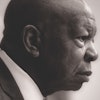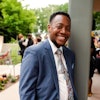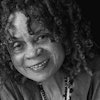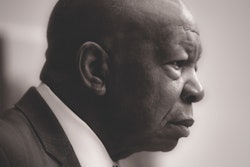On the steps of the Lincoln Memorial, thousands gathered Saturday to reflect and continue the fight for racial justice during the 60th anniversary of the historic March on Washington for Jobs and Freedom.
"We're building a unity here," said Rev. Al Sharpton, the founder and president of National Action Network (NAN), the national civil rights organization founded in 1991. "When we see Blacks and Jews and Latinos and Asians come together. ... It's a unity that we are not going to take this. We're going to march, and so thousands of us in the streets going together. They will not be able to turn back the clock."
The Drum Major Institute joined with NAN to host the event amid recent assaults on affirmative action, and diversity, equity and inclusion efforts. Organizers emphasized that the march was a continuation of the work begun in 1963 rather than a celebration of the past. 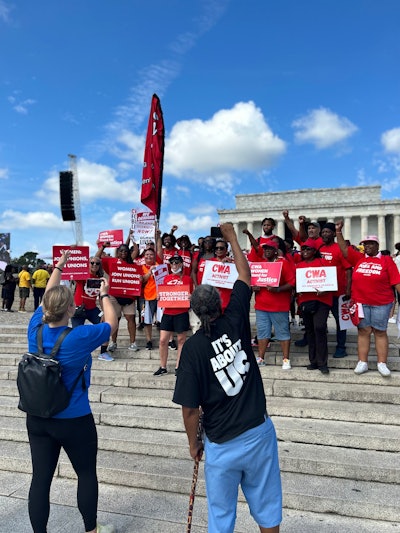 The Communications Workers of America pose in front of the Lincoln Memorial during the 60th anniversary of the March on Washington.
The Communications Workers of America pose in front of the Lincoln Memorial during the 60th anniversary of the March on Washington.
In 1963, with over 200,000 demonstrators, the original March on Washington focused on economic justice and racial discrimination. During King's "I Have a Dream" speech delivered on the footsteps of the Lincoln Memorial, the iconic civil rights leader spoke of the history of slavery and racial discrimination, focusing on the economic disadvantages placed on Black Americans.
Now, 60 years later, his descendants, civil rights leaders, and religious leaders gathered on the same steps and praised the original speakers but also said that there was an urgent need to continue the fight. They highlighted LGBTQ rights, immigration, voting rights, gun violence, and the recent court decision to overturn Roe v. Wade as priorities moving forward.
Hope Giselle, diversity and inclusion specialist and trans activist, said that one of the differences between the current March on Washington and the 1963 March is that contemporary civil rights organizers acknowledge communities and struggles that were pushed to the margins in 1963.
She said that being the first Black trans woman to speak at the march felt monumental. "It feels like the opportunity to make good on this promise that I think that ultimately [King] was making to himself and making to the people who believed in his message, which was equality and justice for all people coming together and really making sure that we can see the humanity in people," said Giselle. "And my existence and being able to be one of the folks who speak on this day embody that exactly."
The attendees gathered under trees to avoid the humidity and sweltering heat. Activists carried signs that reflected causes they cared about, including signs supporting the fight for comprehensive race education, Asian American rights, and gun control.
Gathered under the shade of the trees, Bill Washburn, climate justice chair for the NAACP, Washington DC branch, wore a bright yellow shirt matching the dozens of volunteers hydrating from the heat. Washburn said he watched the first March on Washington as a child in Memphis, Tennessee, and traveled to the first commemorative march in 1983.
As a lifelong advocate, Washburn said he is deeply concerned about how Black people are being erased from the educational curriculum. He said that efforts to eliminate Black history, especially in Arkansas, is dangerous to the future of public schools and the value that Black students may put on themselves. Still, regardless of the challenges, he stressed that the fight for justice must continue.
"To those people who might be just staring at all the negativity that you're seeing, they should remember this old saying that goes all the way back to our ancestors struggling under slavery," said Washburn. "Every shut eye ain't sleep, and every goodbye ain't gone."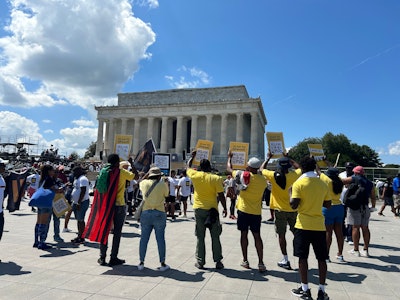 Advocates to cancel student debt pose in front of the Lincoln Memorial during the 60th anniversary of the March on Washington.
Advocates to cancel student debt pose in front of the Lincoln Memorial during the 60th anniversary of the March on Washington.
College students from two dozen Historically Black Colleges and Universities (HBCU) campuses were sporting their college gear; whether representing Howard University, Bowie State University, or the University of the District of Columbia. Students also gathered in groups representing historically Black fraternities and sororities. Many were there holding signs and advocating in response to the recent Supreme Court rulings that ended affirmative action and blocked the Biden Administration's student debt relief plan, as well as police brutality and gun violence.
David Hogg, an American gun control activist and survivor of the Parkland shooting in Florida, spoke at the event with other advocates for gun control. He stressed the inaction surrounding gun control in America and how gun violence is the number one killer for youth and Black men. He emphasized the need for younger people to take power into their own hands, protecting themselves against policies that don't keep them safe.
"We are done running away from this issue," said Hogg. "It is time we start running for office as a generation. Not just for Congress but in places like Lansing and places like Tallahassee and places like your City Hall. Every level of government matters."
Toward the end of the speeches, students were encouraged by Yolanda King, the granddaughter of Dr. King to chant a salute to their generation. Across the Lincoln Memorial, they shouted: "Spread the word! Have you heard? All across the nation! We are going to be a great generation!"
After the speeches, thousands marched a half-mile to the Martin Luther King, Jr. Memorial led by Sharpton and Martin Luther King III. Leaders led the crowd, chanting and carrying on a tradition and a vision for a better future.

